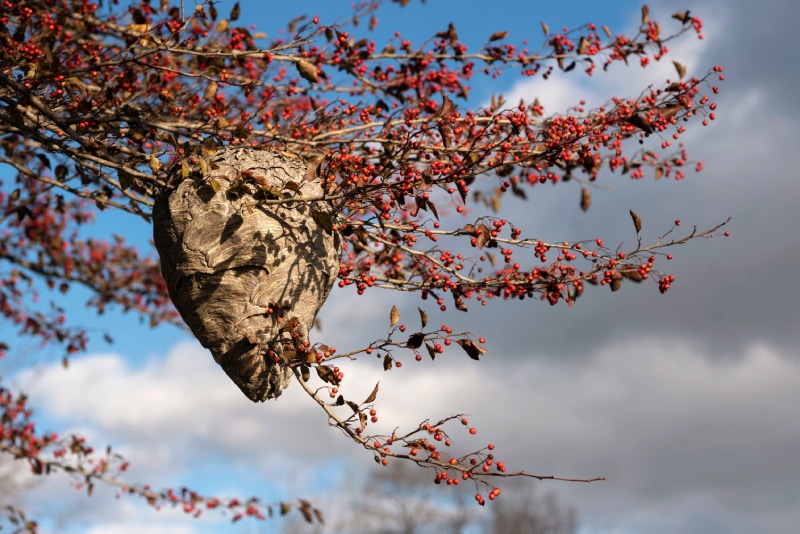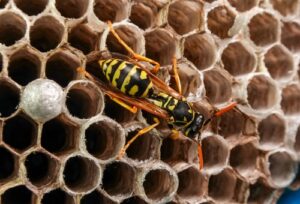Home / Blog / How do I Get Rid of a Hornet’s Nest?
How do I Get Rid of a Hornet’s Nest?

Scientifically reviewed by Daniel Baldwin, BCE, CCFS, CP-FS
-Published on March 24, 2023
-Updated on January 11, 2024
Hornets help the environment by getting rid of aphids and spider pests, but these critters can be scary and hazardous when their nests are situated close to where adults and children live, work, or play. If you notice hornets flying near your house or around your yard, you may be at risk of a painful sting that could cause your skin to itch, swell up, and turn red.
What is a hornet?
A hornet is a flying insect and a type of social wasp. The European hornet is the only true hornet of the genus Vespa in North America. They’re sometimes called giant hornets or brown hornets. These insects have an hourglass shape and brown bodies, with black and yellow rings on their abdomen. European hornets are large wasps with ¾” to 1 ⅜” long bodies.
The Dolichovespula maculata, or the bald-faced hornet, is technically a type of yellow jacket wasp that’s also part of the genus Vespa. Bald-faced hornets are mainly black, with white and black markings on the face and body. Their wings are dark brown. These giant hornets grow to be ½” to ¾” inch in length.
Hornets build paper nests that can hold as many as 400 or more workers. They often fly and hunt at night but are out during the daytime, too. If they feel threatened or need to protect their nests, hornets can sting you repeatedly, releasing a painful venom that can have serious consequences.
Why do hornets create nests?
Hornets build nests to care for and protect the queen and her eggs. The critters construct wood pulp (paper) nests in places that are well protected against rain and direct sun. You may want to get rid of a hornet nest because they’re often built too close to where you live, such as under a home’s eaves, in the corners of porches, in attics, crawl spaces, on tree branches, and beneath your house’s siding.
How do I tell if I have a wasp’s or a hornet’s nest?
There are differences between a wasp’s and a hornet’s nest. Both types of nests are built using chewed wood fibers and saliva, giving the nests papery walls, but the main difference between the two nests is that a hornet’s nest is much larger than a wasp’s nest. While hornet’s nests can be as large as a basketball or bigger, wasp’s nests as usually 4-8 inches long in a hexagonal or tubular shape, depending on the species.
A hornet’s nest holds between 100-700 workers in addition to its queen. Wasps’ nests only house 20-30 insects, with some specific wasps’ nests only having one insect.
How do I get rid of a hornet’s nest?
One of the safest ways to deal with a hornet’s nest is to call a professional pest control company for help. Getting rid of hornet’s nests can be dangerous if the insects are in the nest or close by at the time. They will consider you messing with their nest as a direct attack and can get very aggressive.
Should I be worried about a hornet’s nest?
A hornet’s nest is worrisome to a homeowner mainly if it’s close to where people come and go around the home or where children rest and play. The insects can feel threatened if someone tries to swat them away or comes too close to the nest. If stung repeatedly by hornets, the injected toxins can have serious effects.
How to remove a hornet’s nest
Removing or trying to destroy hornet’s nests on your own can be very dangerous, whether you’re allergic to their venom or not. Even if the nest is as small as a tennis ball, contacting a pest management company is the best way to get rid of a hornet’s nest.
Should you kill hornet’s nests?
If you attempt to get rid of a hornet’s nest by knocking it down, chances are good that any remaining insects will simply rebuild their nest in the same spot. Without the help of professional pest services, hornet’s nest removal is difficult and hazardous.
Will hornets go away on their own?
Hornets will eventually die off when cold weather arrives in the late fall and winter, but the queens will survive. The queen can hibernate until spring in an attic or basement, after which worker hornets will build a new nest, probably near or on your house or yard once again.
Hornet pest control services
Removing or trying to kill a hornet’s nest is dangerous and may put you at risk for multiple stings as the insects protect their home. Our team of experts at Hawx Pest Control understands how to safely get rid of large hornets’ nests. We use the most effective treatments and innovative techniques. Contact our friendly team for your free estimate.
Related Articles
Visit our blog to learn more.
→







